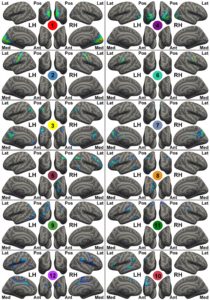Alter Brain Networks and Cognitive Ability with Tai Chi
By John M. de Castro, Ph.D.
” Another great benefit of Tai Chi is that it’s accessible to people of all ages and fitness abilities. It’s the focus on the subtle movements that exercise the brain and boost cognitive abilities.” – Karl Romain
Tai Chi is an ancient Chinese practice involving mindfulness and gentle movements. It is easy to learn, safe, and gentle. Tai Chi has been practiced for thousands of years with benefits for health and longevity. Tai Chi training is designed to enhance function and regulate the activities of the body through controlled breathing, mindful concentration, and gentle movements. Only recently though have the effects of this practice been scrutinized with empirical research. This research has found that it is effective for an array of physical and psychological issues. It appears to strengthen the immune system, reduce inflammation and increase the number of cancer killing cells in the bloodstream, improve cardiovascular health, reduce arthritis pain, improve balance and reduce falls. It also appears to improve attentional ability and relieve depression.
The nervous system is a dynamic entity, constantly changing and adapting to the environment. It will change size, activity, and connectivity in response to experience. These changes in the brain are called neuroplasticity. Over the last decade neuroscience has been studying the effects of contemplative practices on the brain and has identified neuroplastic changes in widespread areas. In other words, mindfulness practice appears to mold and change the brain, producing psychological, physical, and spiritual benefits. Hence, it would appear likely that Tai Chi practice may alter the brain networks underlying mindfulness.
In today’s Research News article “Mind-Body Practice Changes Fractional Amplitude of Low Frequency Fluctuations in Intrinsic Control Networks.” See summary below or view the full text of the study at: http://journal.frontiersin.org/article/10.3389/fpsyg.2017.01049/full?utm_source=F-AAE&utm_medium=EMLF&utm_campaign=MRK_325025_69_Psycho_20170711_arts_A
Wei and colleagues recruited healthy long-term practitioners of Tai Chi (average 14 years of practice) and age, gender, and education matched non-practitioners. All participants performed a flanker task, a measure of executive cognitive function, in which the participant had to respond to the direction of an arrow surrounded by distracting arrows. They found that the longer the practitioners had been practicing Tai Chi the faster they responded in the flanker, executive function, task. This suggests that Tai Chi practice enhances cognitive function.
The participants then underwent functional Magnetic Resonance Imaging (fMRI) brain scanning. The brain scans revealed that the Tai Chi practitioners had a significant reduction in amplitude of low frequency fluctuations in the brain areas called the Default Mode Network (DMN) which underlies mind wandering and self-referential thinking. There was also a significant reduction in amplitude of low frequency fluctuations in the brain areas called the frontoparietal network (FPN) and the dorsal prefrontal-angular network which are associated with cognitive control and executive function. These changes in the low frequency fluctuations suggest that Tai Chi practice produces changes in these networks increasing their functional connectivity.
These results are very interesting and suggest that Tai Chi practice can produce changes in the brain improving the connectivities within large-scale neural systems. At least in terms of the frontoparietal network (FPN) and the dorsal prefrontal-angular network these changes may underlie the ability of Tai Chi practice to improve cognitive control and executive function while the changes in the Default Mode Network (DMN) may underlie the ability of Tai Chi practice to reduce mind wandering and self-referential thinking. Hence, Tai Chi practice alters the nervious system and produces very beneficial effects
So, alter brain networks and cognitive ability with Tai Chi.
“Neuroplasticity may sound like an out of this world term to a normal Tai Chi practitioner but to those who pursue the path of the mind, Warriors of Intention, then this is the proven way of enabling our mind to permanently rewire the way we move.” – Mushin
CMCS – Center for Mindfulness and Contemplative Studies
This and other Contemplative Studies posts are also available on Google+ https://plus.google.com/106784388191201299496/posts and on Twitter @MindfulResearch
Study Summary
Wei G-X, Gong Z-Q, Yang Z and Zuo X-N (2017) Mind-Body Practice Changes Fractional Amplitude of Low Frequency Fluctuations in Intrinsic Control Networks. Front. Psychol. 8:1049. doi: 10.3389/fpsyg.2017.01049
Abstract
Cognitive control impairment is a typical symptom largely reported in populations with neurological disorders. Previous studies have provided evidence about the changes in cognitive control induced by mind-body training. However, the neural correlates underlying the effect of extensive mind-body practice on cognitive control remain largely unknown. Using resting-state functional magnetic resonance imaging, we characterized dynamic fluctuations in large-scale intrinsic connectivity networks associated with mind-body practice, and examined their differences between healthy controls and Tai Chi Chuan (TCC) practitioners. Compared with a control group, the TCC group revealed significantly decreased fractional Amplitude of Low Frequency Fluctuations (fALFF) in the bilateral frontoparietal network, default mode network and dorsal prefrontal-angular gyri network. Furthermore, we detected a significant association between mind-body practice experience and fALFF in the default mode network, as well as an association between cognitive control performance and fALFF of the frontoparietal network. This provides the first evidence of large-scale functional connectivity in brain networks associated with mind-body practice, shedding light on the neural network changes that accompany intensive mind-body training. It also highlights the functionally plastic role of the frontoparietal network in the context of the “immune system” of mental health recently developed in relation to flexible hub theory.
